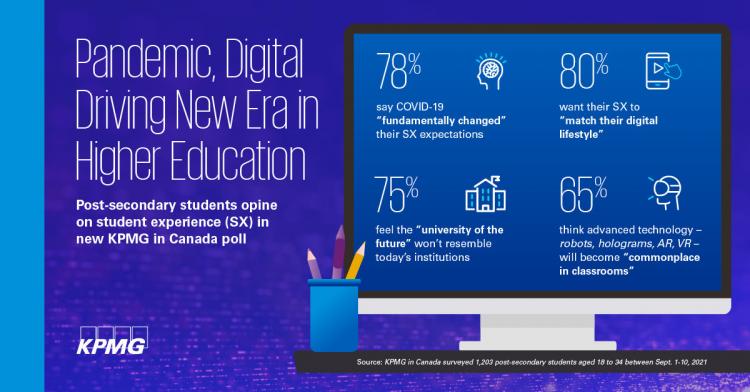Four in five Canadian post-secondary students feel the COVID-19 pandemic has fundamentally changed their expectations of a higher education experience and want a tertiary education that matches their digital lifestyle, finds new poll research by KPMG in Canada.
An overwhelming majority (88 per cent) expect their school to provide the kind of "easy to use and straightforward" digital customer service experience they expect in other walks of life and over three-quarters (76 per cent) believe the university of the future will bear little resemblance to today's education institutions.

"After a full year of remote learning, Canadian post-secondary students - who grew up on social media, streaming, food-delivery and ride-sharing apps - expect their college or university to up their game digitally," says C.J. James, Partner and National Education Practice Leader, KPMG in Canada. "Our poll research shows students want and expect more. Over the next decade, students will become even more diverse, digital, and deliberate in their decision making, putting pressure on higher education institutions to design and deliver a more personalized experience that encompasses the student as a learner, a digitally savvy person, and a customer."
Key Poll Findings:
- 78 per cent of post-secondary students agree the pandemic has "fundamentally changed" their expectations of their higher education experience
- 80 per cent want "an educational experience that matches my digital lifestyle"
- 88 per cent want the post-secondary institution experience (e.g. registration, payment, course materials, etc.) to be digitally accessible online or via mobile phone, saying it should be "really easy to use and straightforward"
- 76 per cent believe the "university of the future will bear little resemblance to today's educational institutions"
- 69 per cent say advanced technology - from robots and holograms to augmented and virtual reality - will become commonplace in classrooms, with 73 per cent of students in Quebec agreeing
- 68 per cent say they would be comfortable using an assistant chatbot if it meant freeing up a professor's time to help with more complex questions
- 82 per cent wish their higher education institution had a stronger focus on mental health and well-being
- Three in five (60 per cent) students have formed a favourable impression of their institution and built a foundation of lifelong loyalty
-
- Men felt a lifelong loyalty bond more than women, 65 per cent vs. 56 per cent, respectively.
- Those in B.C. felt less of a bond, 55 per cent, while students in Quebec felt more of a bond, 65 per cent.
-
In terms of defining what constitutes the "best student experience (SX)", they want a "personalized learning experience" and "environment conducive to learning".
When asked what impedes their success, students identified three main challenges: "feelings of stress", "internet connectivity", and "level of motivation".
The COVID Factor
The vast majority of students were positive about how their post-secondary schools managed the education experience during the pandemic, with regular and helpful communications, although many felt the isolation, with nearly two in five saying they did not feel part of a community of staff and students. Nearly nine in 10 (87 per cent) said the quality of their remote learning experience depended on the faculty's comfort in teaching in that format and most (80 per cent) felt their institution should use video, mixed reality, simulations, and holograms to improve the remote learning experience.
Heading into the 2021-22 school year, over two-thirds (68 per cent) of students say they feel anxious about going because of new highly contagious COVID-19 variants, prompting nearly three in five (57 per cent) to decide against living in dorms or on campus. More men than women chose not to live on campus due to COVID, 64 per cent vs. 51 per cent, respectively.
Other poll highlights include:
- 71 per cent called "campus life important" to them and were looking forward to returning to in-person classes
-
- This jumped to 82 per cent in the Maritimes
-
- Nearly two-thirds (65 per cent) intend to play varsity sports and participate in clubs and events even though they acknowledge catching the COVID virus remains a risk
- 82 per cent said they are fully vaccinated against COVID-19 or expected to be by the time they started the Fall term, in line with previous KPMG poll research that found eight in 10 Canadians would line up for a shot if vaccines were offered to them. To date, according to COVID-19 Tracker Canada, more than 80 per cent of eligible Canadians have been fully vaccinated.
-
- By comparison, 76 per cent of post-secondary students in Alberta were or planned to be fully vaccinated. In Quebec, 85 per cent were or planned to be.
- The percentage was also lower for first-year students at 79 per cent, while fourth-year students were at 88 per cent.
-
- Three-quarters (75 per cent) feel all staff (faculty and administration) should be required to be vaccinated against COVID-19
- Over four in five (82 per cent) students expect their institution to have "a clearly articulated climate plan" with defined goals and strategies to go carbon neutral. This cohort said, "climate change is important to me."
KPMG surveyed 1,203 Canadian post-secondary students, aged 18-34, from Sept. 1-10, 2021 on Delvinia's AskingCanadians panel via its Methodify online research platform. Sixty-one per cent are full-time students, 27 per cent are enrolled in part-time studies, and 13 per cent are in a post-secondary school certificate program. The margin of error is +/- 2.8 percentage points.










